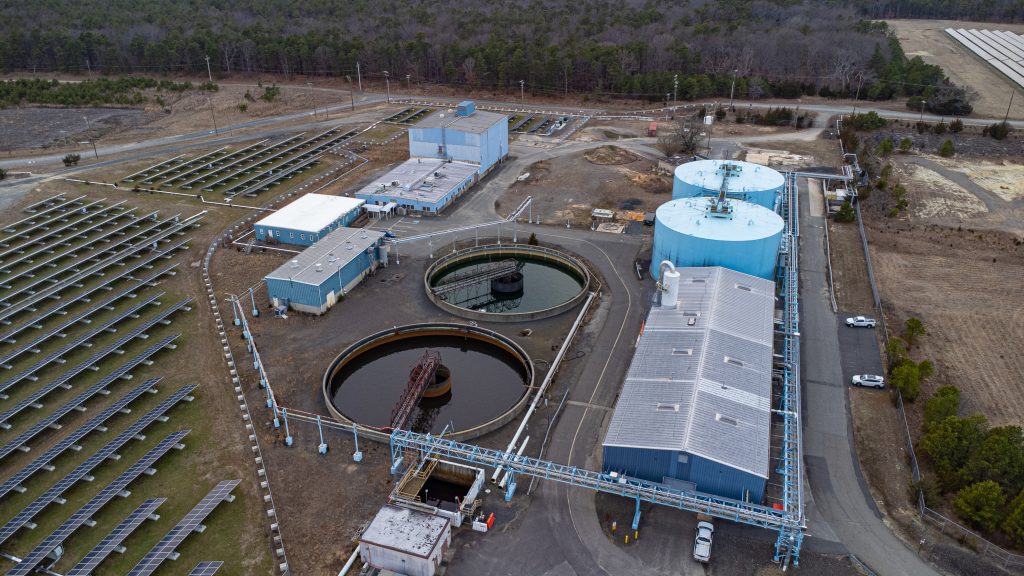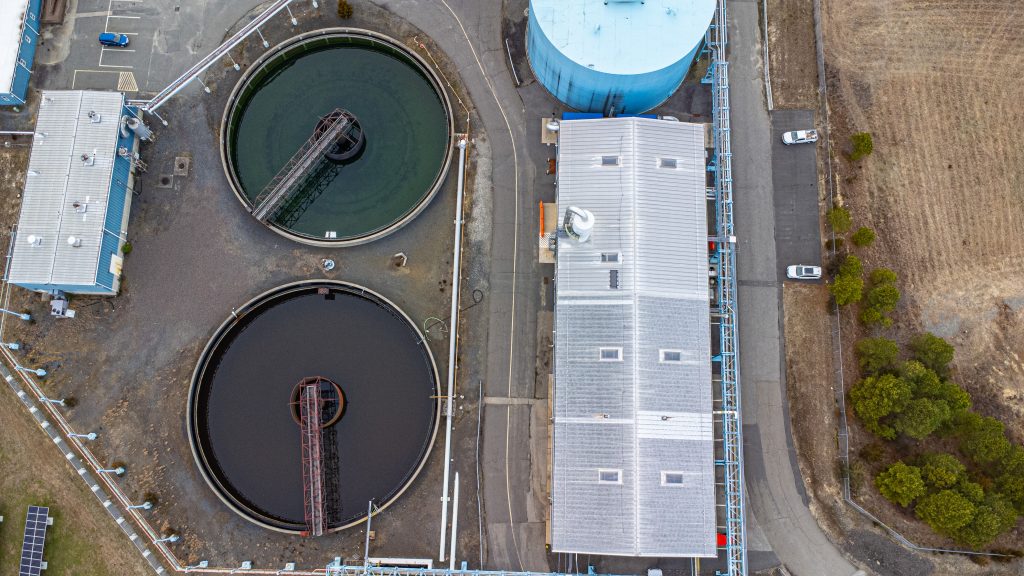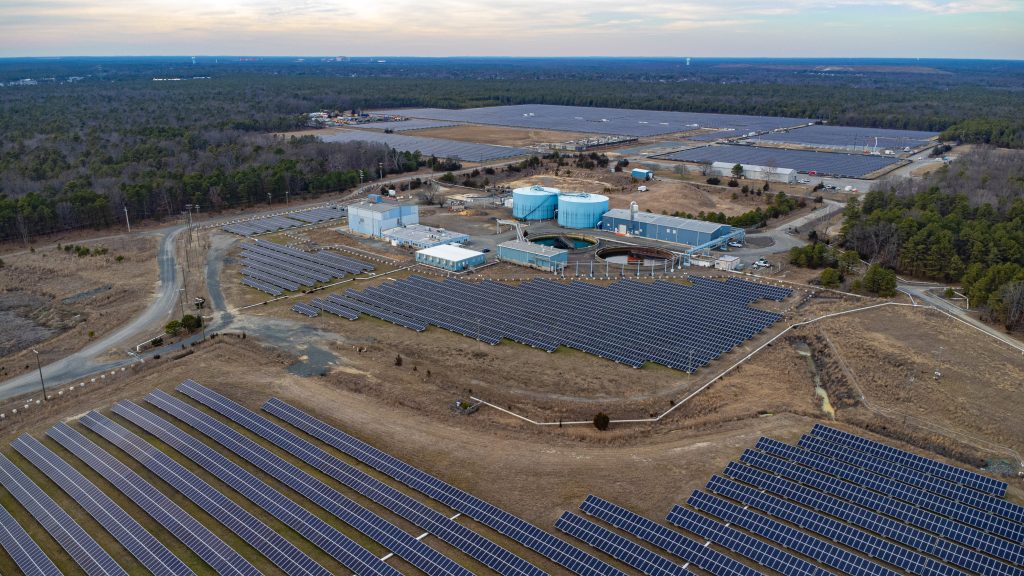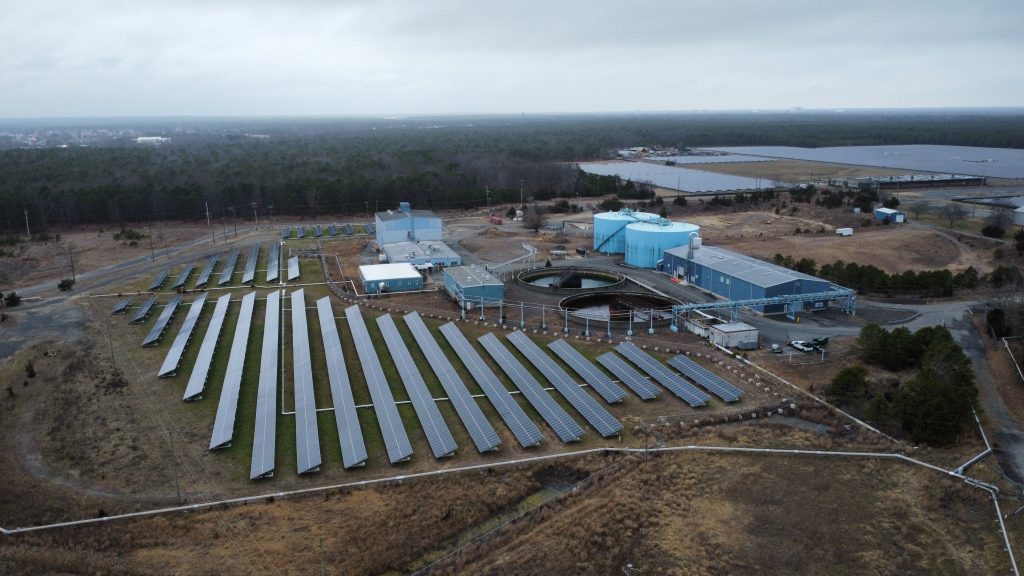Senior officials with the state Department of Environmental Protection addressed Shore area residents, officials and environmental advocates Monday night at a public meeting on a proposed settlement of the state’s claims surrounding the former Ciba-Geigy property in Toms River.
In what turned into a marathon, five-hour-long question-and-answer session at Toms River High School North, new details on the proposed settlement between the state and BASF, the German-based successor company to Ciba-Geigy, emerged. It was BASF – not the state – that first proposed the settlement, and state regulators said they favored the restoration of land above any financial penalties that could be levied upon the chemical-producing conglomerate in litigation.
A settlement proposal, announced in December, would place a conservation easement upon 1,000 acres of the approximately 1,250 acre site where Ciba-Geigy manufactured chemical dyes for decades, ultimately contaminating the surrounding area, polluting local waterways and creating a 552-acre toxic plume that was linked to elevated rates of cancer and other medical consequences for Toms River residents. Under the settlement, BASF would not be subject to any monetary penalties or punitive damages, and would retain about 250 acres that could be developed for profit. The details of the settlement enraged some local officials who said they were locked out of the settlement talks and, in some cases, surmised that political ties between the Murphy administration and the German business community may have led to the proposal.
Mayor Maurice “Mo” Hill criticized DEP Commissioner Shawn M. LaTourette for his absence at Monday night’s meeting, eliciting a rare terse response from an otherwise even-keeled Kevin Moriarty, Deputy Commissioner for Legal, Regulatory and Legislative Affairs, who led the meeting in the commissioner’s stead.
|
|
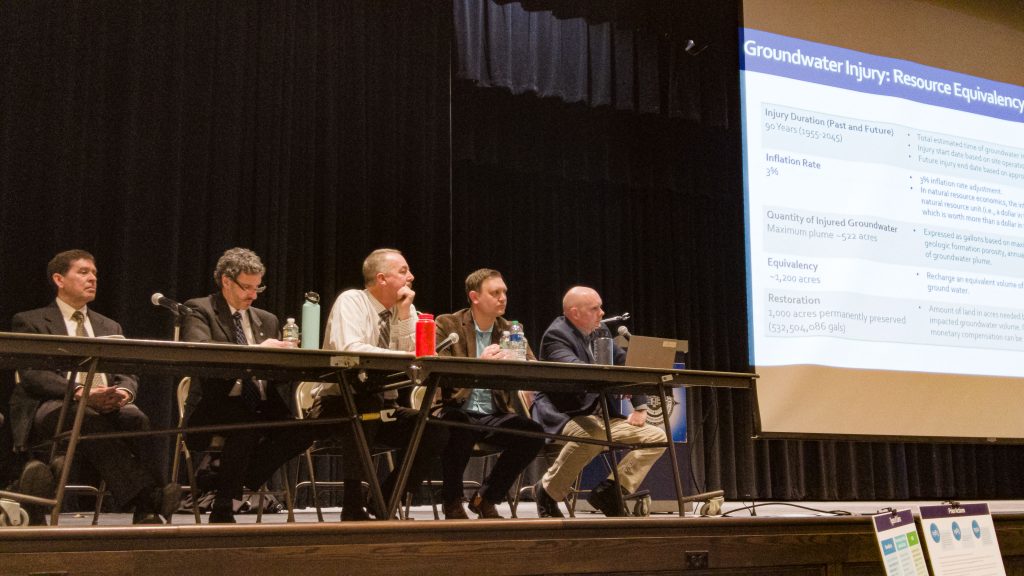
A group of NJDEP officials address the community at Toms River High School North, March 13, 2023. (Photo: Daniel Nee)
“I believe your leader did you a disservice,” said Hill, addressing Moriarty, who had earlier told more than 100 residents who attended that he, too, was a Toms River resident. “BASF, just like Ciba-Geigy, is playing us once again with this settlement. Let’s not let history repeat itself. This is a bad deal.”
Moriarty, responding to concerns leveled by officials as well as residents at a prior hearing organized by Save Barnegat Bay, said that financial penalties upon BASF is not the priority within New Jersey’s environmental statutes. Instead, when it comes to natural resource damage, or NRD, claims, preserving or rehabilitating an equivalent amount of resources is prioritized. He also said that the state’s settlement focuses only on the land use aspect of the pollution, and individuals who believe they were harmed by the site’s contamination or the company’s practices would not be precluded from filing their own litigation if they deemed it necessary.
“In New Jersey, any adverse change … involving chemical contamination constitutes a resource injury under our laws,” said Paul Stofa, a chief advisor on resource damage litigation at the DEP. “When you have a measurable injury, you then calculate the damages that result because of that injury. Land preservation is very important for our groundwater settlements, because it’s preserving the land in perpetuity.”
He continued: “We often think of dollars and cents, but in terms of natural resource defense, you want an equivalent amount of natural resource to reimburse you for another natural resource injury.”
The DEP officials said the 1,000 acres that would be preserved, much of which would be turned into a park with walking trails and other amenities, fulfills that “reimbursement.”
Hill has demanded the state require BASF to convey the 250 acres that will not be preserved to the township, as well as establish a long-term compensation fund for victims, and provide the township with oversight authority over the property. Hill, along with other officials, questioned how the state can consider the preservation of 1,000 acres the company said was “basically worthless” during a tax appeal that cost Toms River taxpayers $17 million a fair settlement. Moreover, BASF stands to generate millions of dollars on a portion of the acreage from a solar array, and could potentially sell other portions of the 250 acres it will retain under the settlement for a major profit if it were to be commercially developed.
DEP officials used the recent preservation of the Breton Woods parcel in Brick Township as an example of the value of such a practice, based on its value of $8.4 million for 31-acres. The officials would receive major pushback on the claim, considering the Breton Woods property was a developable parcel with no environmental contamination, and legally zoned for single-family homes.
“It’s interesting, tonight, I heard this was worth $200 million,” said Hill, of the Ciba-Geigy site. “In 2020, Toms River paid $17 million to BASF” after the company won a tax appeal.
“I guess they’re generating 29 megawatts of electricity on a worthless property,” he said.
“I’m not saying it’s perfect,” admitted Moriarty, emphasizing his belief that if the state were to turn down the settlement and pursue litigation inclusive of punitive damages, a court may be reluctant to “punish a successor company” like BASF for environmental crimes committed in decades past by a company which no longer exists.
While state law requires BASF to remediate the site and pay for environmental cleanup and monitoring, punitive damages are less defined by the letter of the law, and more subjective.
“The first priority, as we read the constitution, is on-site preservation,” said Moriarty, who acknowledged his team did not review the tax appeal litigation involving the site before proposing the settlement.
Assistant DEP Commissioner David Haymes, who hosted a portion of the presentation before a question-and-answer session, said at least 50 samples were taken at the site where the portion of the 1,000 acres are due to be turned into a park. The samples were dispersed across the site and were taken between ground level and 2-feet under the soil. Separate testing is completed for deeper soils near aquifers. Those tests, he said, showed the areas that will be open to the public are within the standards for residential use, which are more stringent than passive recreation.
“All of the results were analyzed and compared to the state standards, and all results were below the residential remediation standards – and those are conservative numbers,” said Haymes.
By the state’s calculations, it would be safe for a person to be at the approved portion of the site 24 hours per day, seven days per week, for 26 years.
“The sampling that was done shows the soil in this area is sufficient for recreational use, and BASF is not going to be walking away,” Haymes said.
“We’re not talking about inviting folks to a property that is highly-contaminated,” said Moriarty. “The areas being preserved are largely outside of the operational areas of the site. They are areas where DEP’s investigation found no evidence of operations, and we think that’s an important fact people should key in on as we move forward.”
Representatives from several environmental organizations called on the DEP officials to reconsider the proposed settlement or incorporate compensation for victims as well as the overall economy and sullied reputation endured by Toms River. They also asked the state to extend a public comment period into the summer. Originally, the state had opened a comment period for only 30 days, much of which fell over the holiday season in December, but relented and extended it until April. A representative from the Sierra Club asked the comment period to be open until June or July “at the earliest.”
Overall, most of those who spoke asked for a larger breadth of information to be released by the state with regard to the formula that produced the notion of 1,000 preserved acres representing a fair settlement of the Ciba-Geigy claims. The officials showed a PowerPoint slide with their conclusions, but held back the formulaic considerations, telling those assembled that if the matter were to go to court, the formula could be called into question and used against the DEP.
Michele Donato, the Lavallette-based attorney who has long represented Save Barnegat Bay, was among the final speakers of the night, and told the DEP contingent that the settlement was simply not sufficient.
“This is gelatinous,” she said. “It’s hard to figure out what part of this is real. It’s very clear you were sent here to justify it. It’s who you work for, I get it.”
Ultimately, she concluded, more information will be required before the public can make an educated judgment on the settlement terms. Utilizing a specific measurement of contaminated land to determine the value of a settlement is “an approach that may never have been used in court.”
“You’re conflating privilege with settlement, and it’s causing you to be distrusted, and it’s not fair to you to be distrusted,” Donato said. “It’s not fair to you, to the public or the township. And it’s also not fair to Save Barnegat Bay to use our resources to protect the community when it’s your responsibility to protect the community.”

Advertisement

Police, Fire & Courts
Grand Jury Indicts Point Pleasant Man, Once a Fugitive, for Attempted Murder

